- Home
- Linda Byler
The Homestead Page 4
The Homestead Read online
Page 4
Take this whole catastrophe. Plopping his family down in the middle of a gigantic haystack, no thought for where he would get lumber or glass windows or shingles, just slapping logs into the form of a house, as if he knew what he was doing. She could not imagine that log dwelling keeping out the rain or the cold, the way he was going at it.
Hannah knew her place, though. She knew she could not say everything she thought and that about three-fourths of her thoughts were like seeds on unproductive ground: they withered before they took root and turned into words. Manny told her she needed to keep more of them to herself. It was not necessary to say everything she thought.
Well, maybe so, but Dat was going to need help with that building unless he came up with a better plan. What was he going to use for a roof? She’d bet he hadn’t thought that far, or perhaps he’d prayed that a roof would fall out of the sky and land on top of the walls.
Hannah scraped her plate clean, fishing the last bean from the side of her bowl. The sky turned gray, but a soft white gray, so perhaps the day would turn out cloudy, without sun, and no cold rain would fall.
Dat seemed in no hurry to accomplish anything, so Hannah wandered off to check on the horses. The wind was picking up. She noticed a sharp edge to every breeze, bending the grasses, ruffling them with gusts.
She lifted her eyes to the sky, taking in the shifting clouds. The now strange yellow light turned even the gray clouds a sickening color. Like vomit. The yellow light washed across the brown grass, turning it into a dark and sinister sea of ever-changing shadows.
It was late March, so surely this strange light and these churning, roiling clouds that erased the morning sun would not be the harbinger of snow. Or one of the Midwestern blizzards she had read about in her history book at the school she attended back home in Lampeter Township.
Hannah’s large brown eyes took in the changing light, the bank of clouds. She wrapped her hands around her waist, her shoulders squared, wide and muscular on a tall, thin frame, her feet planted wide, leaning against the wind. She was defiance, strength, her unwashed hair in loose coils that stayed in spite of the growing gale.
As she stood and watched, the air took on a new chill in a few minutes. She shivered and wrapped her thin coat closer. Her calculating thoughts took stock of their situation. A sweep of prairie as far as she could see. The horses on their hobbles. The small pile of firewood, the fire out in the open, her mother bent over it. The only shelter, or some form of obstruction, was the four walls of the house, the stark rafters jutting into the sky, the Conestoga wagon with its worn flapping canvas.
Sitting ducks, that’s what we are, she thought. Genuine sitting ducks. Greenhorns from the East who don’t know anything about this high prairie and the weather that can wipe us all off the earth. Dat has so much faith. He’ll just turn all soft and reverent, lift his face to the sky and place his trust in God alone, thinking He’ll preserve us, and if our time is up, we’ll go to our eternal home. Oh, I know how he thinks. Well, maybe I’m not willing to leave this earth quite yet.
With that, she stalked back to the camp and stood before Mose, who was eating his breakfast, hungrily slicing his cornmeal mush with his knife, a serene smile on his face, the welcoming light in his eyes as he watched Hannah’s approach.
“Good morning, Hannah. Have you slept well?”
“Yes. Dat. Did you watch the sky this morning? Do you sense the wind?”
Mose finished chewing, swallowed, and then smiled. “Yes, Hannah, I did. I believe we’re in for some hard rain.”
“What about snow? It’s only the end of March. We are not prepared to survive a winter blizzard, the way they arrive here in the West.”
“Oh, I don’t believe we’ll have snow. The weather has favored us so far this spring. Our house will soon be finished.”
Sarah sat on the stump, her plate balanced on her narrow lap, and looked from Hannah to Mose and back again. As usual, the decision was up to Mose. “I figure we’d better hitch up the horses and move out, find the Jenkins’ place right quick. We can’t survive snow and wind if it’s a bad storm,” Hannah said forcefully, spreading her arms, her hands palms up in a pleading gesture.
Mose finished scraping beans off his plate, deep in thought. He lifted his head to search the sky, watching the bank of gray building in the northwest. The sun was white, barely visible by the haze of yellowish gray smeared across it.
“Why don’t we pray?” he finally asked.
“You can pray if you want, Dat, but I think we should get out of here. Now!”
“What about stretching the canvas across the rafters of the house? Could we quickly make a temporary roof? We’d have the four walls, such as they are,” Mose said, his eyes searching his wife’s.
“We could. But if this is a blizzard, how could we secure a canvas good enough to withstand the winds?”
Mose considered this, tugging at his long, dark beard. His eyes went to the clouds, and back to Hannah, his daughter, who was fast growing into an adversary, a presence he did not understand. A girl growing into a woman, outspoken with quick words and brute strength, the opposite of his soft, winsome wife and her quiet, accommodating demeanor, her willingness to let him lead in all things.
His first response to Hannah’s plan was to reject it. A rebellion he did not understand welled up inside him. Who did this upstart think she was? His eyes went to the skies, back to the yellow brown of the moving prairie, ominous with the unnatural light that lay over the landscape like a threat.
He was still considering, mulling things over, when Hannah turned suddenly and pointed. Low on the horizon a dark, fast-moving blur that quickly came on, until they saw three riders bent low, their horses lathered, slick with sweat, their nostrils flaring red. They slid to a stop, breathing heavily, the riders flinging themselves off, the horses stretching their necks, tugging the reins from the riders’ hands, then stood, intent on breathing.
It was Hod Jenkins and what Hannah assumed were two of his boys. In the harsh, yellow light he looked formidable with his dark, weathered face, his beard like frayed cloth, his clothes slick with grease and dirt. The boys were younger replicas of their father, tall and thin with angular features. Their hats were pulled low on their foreheads, their hair the color of the old tomcat back on the farm. Torn jeans and worn-out boots with crooked heels worn down from years of wear in all sorts of weather.
Hod wasted no time, minced no words. “Don’t like the looks of this.” He lifted a hand to the sky, a gnarled finger pointing in the sun’s direction. “You better come with us. We don’t have much time. I don’t like the looks of this,” he repeated.
Mose was at a loss for words. His gentle brown eyes worriedly searched the sky. Then his brow became smooth with his childish faith. Turning, he told the men he appreciated their concern and was thankful for good neighbors, but he believed the Lord would provide.
Hod let fly with a string of forceful words, telling Mose that he could think that if he wanted, but his thought of staying here unprotected on the high prairie was foolish. The temperature could plummet to a freezing low with strong winds and biting, icy snow. More folks than he could count had met their deaths, frozen less than a mile from home. “You don’t mess around with Mother Nature, I’m tellin’ you now,” Hod finished.
Sarah stood, pulled her coat closer, shivered, and watched her husband. She could tell what he was thinking by the untroubled expression in his brown eyes. He wanted to stay and place his trust in God alone.
Manny came stumbling from his bedroll behind the wagon, his face alarmed at the presence of these men, their blowing horses, the dark sky and the sense of unease. He stood with his hair sticking up every which way, unwashed, his blue chambray shirt wrinkled from his night’s sleep.
From the wagon, Mary and Eli’s dark heads poked out from beneath the canvas, their faces alight, black eyes curious, without fear.
Hod waited, watched the sky, his boys’ heads lowered, scuffing at the dirt with
their boots, hands hooked in their jeans pockets.
But Mose was not stubborn or headstrong. He did not place trust in his own way. In the end he figured that Hod knew more about the weather in North Dakota than he did, being a newcomer and all. Yes, God did provide. God knew every sparrow that fell to the ground, but he also felt the wisdom of letting Hod advise him where the weather was concerned. And so he gave his consent.
Hold told them there was no time to waste. They had best get that wagon going as fast as possible. His clipped words were obeyed. Mose brought Pete and Dan and hitched them to the wagon. Sarah and the children stored their belongings beneath a canvas in a corner of the house. They packed extra clothing in a small trunk. Hod told them to leave the food; there would be plenty at his house.
The riders went on ahead, leading the way. Mose drove Pete and Dan, prancing, misbehaving, jerking at the traces, pulling left rather than right. Sarah sat on the wagon seat clutching Eli as his head bumped one way then another. Mose sawed at the reins and tried to control the team.
Sooner than he thought possible, Mose guided the horses onto a good dirt road. In spite of the line of grass growing in the middle, it was more than wheel tracks in trampled grass. It was a good road.
Hannah stood, clutching the back of the seat for support and watched Hod and his boys ride. She had never seen anyone ride like that. It was as if the rider was merely an appendage, part of the horse, like an extra leg, something attached. It was a sight to behold, this skill of sitting on a horse so easily, a grace that stirred her senses. If it was the last thing she did, she would learn to master the skill of riding a horse, not just bouncing along, her legs flopping like a sack of feed.
Hod kept watching the sky, then held up a hand to get their attention. “Storm’s movin’ in awful fast. We still got an hour to go. If’n I was you, I’d get them horses going right smart.”
Mose nodded. He had felt the change in the atmosphere, felt the air hitting his face turn frigid, slamming into his chest as if the buttons weren’t securely closed.
Pete and Dan, the faithful brown Standardbred and Hoflinger cross, felt the storm’s approach, the static, the wind and cold increasing as they trotted.
Sarah grimaced, holding on to the metal rim attached to the side of the heavy wooden seat, the wood and steel wheels jarring even with a slow steady trot. Now at every dip or hole in the road the thick mud was like glue. The horses tugged unevenly and threw them all around like corks in a bucket. But with the lowering skies, it was better to stay quiet, grit her teeth and endure the torment to her heavy body.
She felt Hannah’s sharp knuckles through the folds of her skirt. She turned and found her daughter braced against the seat, her eyes burning dark with excitement, the storm mirrored in the depth of her gaze, watching the riders, a half smile on her face. She was enjoying the whole bit—the riders, the frightening weather—as if it was a deliverance, elevating her above the drudgery of their trip and the endless hard work that followed. Ah, Hannah, how will we be able to keep you with that spirit within?
The light was fading fast. The bank of yellow gray was changing to solid gray that spread over the enormous sky and the prairie below. Mose saw the storm, recognizing a fraction of its fury. His eyes widened as he leaned forward, bringing both reins down on the backs of the tiring horses. Sarah looked at him sharply. To goad a jaded horse was just not her Mose.
Hod yelled at the moment Sarah felt the first spit of snow. The atmosphere lowered, crushed the breath from them, as if a giant hand swiped through the air and took all the oxygen with it.
Hod pulled his horse back until he was level with Mose, who was concentrating on keeping the wagon intact and on four wheels. If there was an accident now, they might not make it to the ranch at all.
“Use your whip, if you got one!” Hod roared. “We got another few miles, but she’s comin’ fast. Keep your eye peeled for my buildings. If they get wiped out, concentrate on that spot. Your life and your wife and kids might depend on it.”
Mose spoke sharply. “Hannah, help your mother get in the back.”
“I can’t,” Sarah cried. Before she could muster any resistance, Hannah’s powerful grip seized her shoulders, clamped down like a vice, and flipped her over the low back like a cat. Sarah cried out in fright. She grabbed an edge, anything within reach. It was the sturdy wooden trunk. She hung on like a drunk lost in his own dizzying world.
Mose was bringing the whip down on the terrified team, lunging and galloping, wild-eyed, the lather flying in white flecks into the howling wind. There was a gray whirling outside now. Through the small hole where the canvas was drawn together by a heavy ford, Sarah caught glimpses of a driving, slanted snow so thick it looked like the foam from the dishpan. She realized now they may never reach the Jenkins’ ranch. She had heard of folks dying in a storm, disoriented, frozen to death. But in March? In early springtime?
She heard Mose yell, calling hoarsely and still goading the weary horses. Above the wagon’s clatter, she heard a faint call like the bleating of a sheep.
On rattled the sound of flying hooves, creaking wood, flapping canvas, the children’s whimpers, Mose’s voice like a hoarse scream. Another sound above the wind’s howling and the roar of the snow. Again, that sheep’s bleating.
The wagon slowed. Sarah felt it turn and tilt at a crazy angle. Mose’s voice rose again. Sarah hit her head on the trunk as the horses broke into another frenzied gallop. Hannah yelled out to Mose in a panicked voice, screaming, “Left, Dat. Left. Bear left. I saw something!”
Mose did not hear, intent on the lagging horses, coaxing only a bit more speed. With an impatient snort, Hannah heaved herself up over the seat, grabbed the left rein and hauled it in, using both arms, her feet sliding off the dashboard now coated with ice and snow.
Mose tried to gain a hold on the left rein, but Hannah shouldered him away. Straight ahead a black hulk rose through the storm. Mose cried out, his relief putting him back on the seat, giving Hannah both reins. She kept her feet positioned against the dash, squinted through the thick gray turbulence, the whirlwind of snow, ice, and wind, elements that had the power to bring death to all of them.
When she pulled the team to a stop, dim figures appeared out of the black wall, pushed aside a part of it, the smell of hay, straw, manure, and oats, all pungent sweet smells from the interior of a barn, mixed with the roaring wind.
Hannah jumped down off one side, Mose the other, their hands like frozen chunks of ice as they fumbled to loosen the traces. Someone pushed her aside. Someone else took her arm in a tight grip and pulled her into the barn. Another person appeared out of the gloom and told her to stay; they would bring in the rest.
Hannah was startled into obedience long enough to step aside and allow the steaming, panting horses to be led through the wide door. Foam, white lather, and sweat that had been rubbed against their skin by the chafing harness, dripped off their bodies. Their flanks quivered, their sides heaved.
Hod appeared carrying Eli, with Mary clinging to his hand. Manny led his mother through the door, white-faced, her lips twisted in pain. Mose was the last one in the door, his hat carrying a layer of snow, his face red with cold, his eyes still wide with the real danger his family had experienced.
The horses were cared for first, rubbed down with gunny sacks and given small amounts of water and hay. “No oats yet,” Hod said stiffly. “It’ll kill ‘em, blowing the way they are.” Mose nodded gratefully. He noticed the row of stalls, crude and makeshift but clean and mucked out, spread with fresh straw and plenty of hay, the watering trough clean.
“A’ right folks. We need to get to the house and to do that, it’ll take all the wits and common sense we got. We can’t see more’n a few inches in front of our faces. Let’s put the women folk between us.” He turned, his gaunt, chiseled face taut with concern. “We ain’t got no clothesline to hang on to, and this ‘n’s a humdinger. Biggest March storm I ever seed all my born days.”
He call
ed to his three sons, who stepped up in various stages of slouching, all tall, slim and crowned with the same battered wide-brimmed Stetsons rimmed with dirt and grease. “Clay, you’re first. Your sense of direction’s the best. Like a homing pigeon. See if you can get us to the house. Now, whatever you do, don’t let go of the hand you’re holding. If you slip and fall, yell as loud as you kin, a’right?”
He pushed Hannah forward. “Take this ‘un, Hank. Take her other hand.” And so Hannah found herself grasping two gloved hands. The rest of the family was strung out, children between adults.
“You best start yer prayin’ early,” Hod said, but good-natured. Mose nodded. “You know if we miss the house we could all freeze to death wandering the prairie in circles. That’s a human condition, a natural thing, to go in circles when it feels like yer goin’ in a straight line.”
Hannah thought he was making a big deal out of nothing until they stepped out into an alien world that contained a fierce cold. The whirlpool of snow and wind sucked all the air from your lungs and left you floundering to get only a fraction of what you needed, like a catfish on the riverbank before it was put on a stringer.
The cold slammed into her, through her thin coat and heavy skirt. Her hands that had been cold before were numb within seconds. There was no use trying to see through the gray, whirling whiteness of snow and ice. It was like being blind, but not black—only moving particles of white.
They kept moving forward. No one fell and no one hindered Clay’s steady progress. The snaking line of human beings were being introduced to forces of nature they had no idea even existed. The worst they had ever experienced was a heavy, crackling, sizzling thunderstorm in the fertile valley called Lancaster County.
There was a bump and a shout. Clay had hit the corner of the house. More shouts went up and were snatched away by the powerful wind. Clay felt his way along the side of the house and found the porch. He stepped up on the porch and would not relinquish his hold on Hannah’s hand until every last person was grouped on the porch, all accounted for and standing on his or her own two feet.

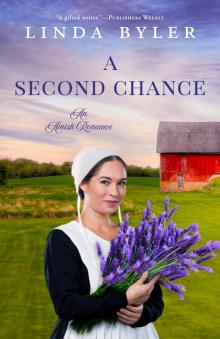 A Second Chance
A Second Chance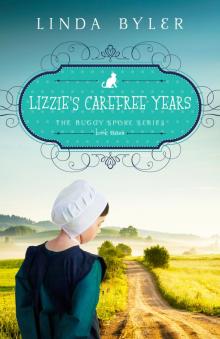 Lizzie's Carefree Years
Lizzie's Carefree Years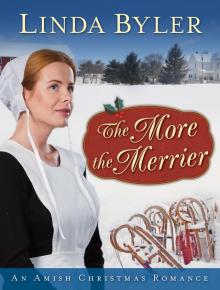 The More the Merrier
The More the Merrier Love in Unlikely Places
Love in Unlikely Places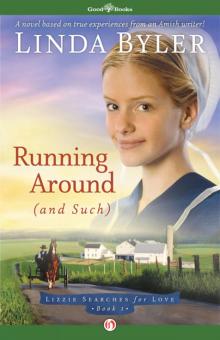 Running Around (and Such)
Running Around (and Such) Wild Horses
Wild Horses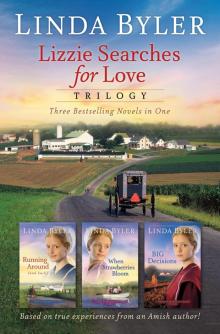 Lizzie Searches for Love Trilogy
Lizzie Searches for Love Trilogy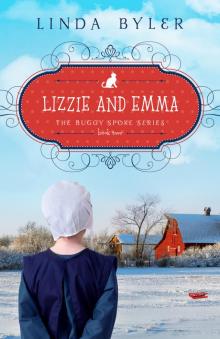 Lizzie and Emma
Lizzie and Emma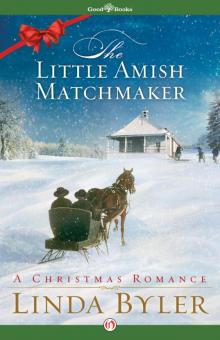 Little Amish Matchmaker
Little Amish Matchmaker The Witnesses
The Witnesses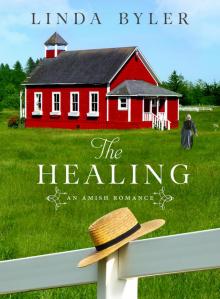 The Healing
The Healing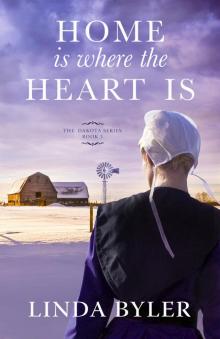 Home Is Where the Heart Is
Home Is Where the Heart Is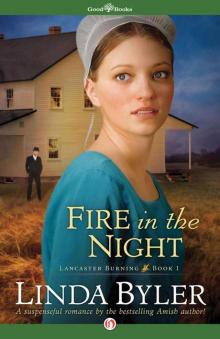 Fire in the Night
Fire in the Night When Strawberries Bloom
When Strawberries Bloom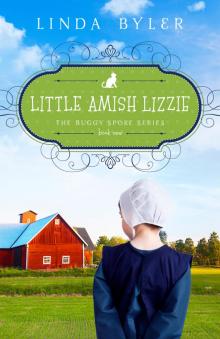 Little Amish Lizzie
Little Amish Lizzie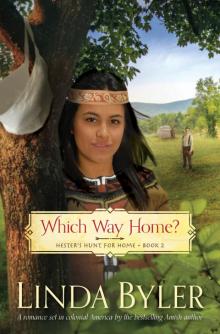 Which Way Home?
Which Way Home?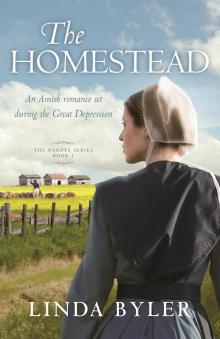 The Homestead
The Homestead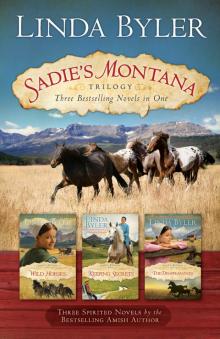 Sadie’s Montana Trilogy
Sadie’s Montana Trilogy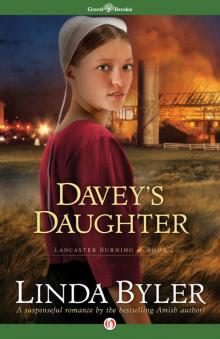 Davey's Daughter
Davey's Daughter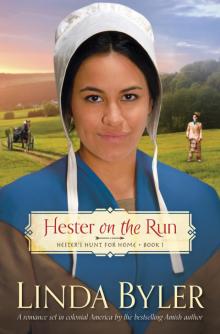 Hester on the Run
Hester on the Run Disappearances
Disappearances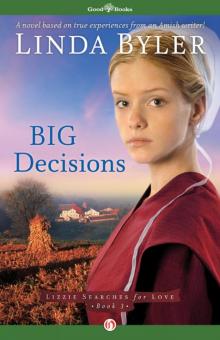 Big Decisions
Big Decisions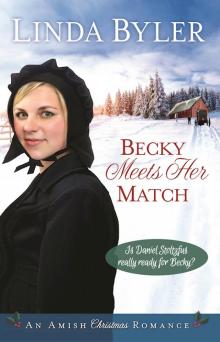 Becky Meets Her Match
Becky Meets Her Match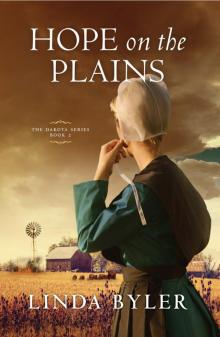 Hope on the Plains
Hope on the Plains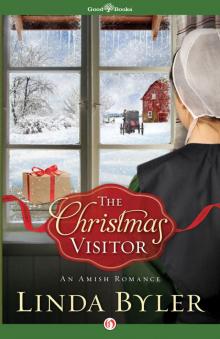 Christmas Visitor
Christmas Visitor